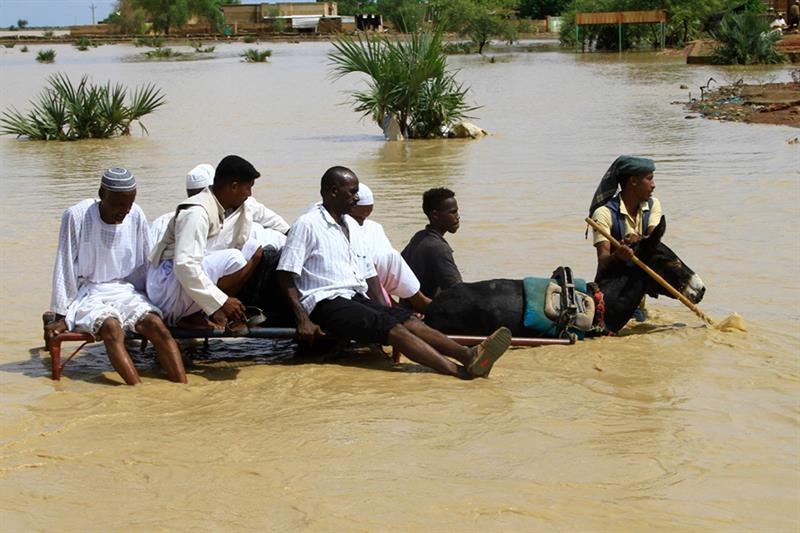There is “a sense of frustration among young people for not being able to have a say on a matter as important as climate change,” Hanae Bezad, a young tech entrepreneur and consultant from Morocco, said during a webinar organised by the Egyptian Centre for Economic Studies (ECES), a think tank.
The webinar brought together young African entrepreneurs and opinion leaders to give their views on climate change. According to Bezad, the younger generations in Morocco and the North Africa region have a “strong awareness” of the dangers of climate change, the hazardous effects of which have been manifested in the recent droughts that have hit the North Africa region and negatively impacted businesses.
The webinar gauged the participants’ thoughts on climate change and its adverse impacts on social and economic conditions in Africa. Also discussed were solutions that can be devised to mitigate the negative effects of global warming.
Ghanian Cedric Dzelu, YMCA climate change ambassador to the upcoming UN COP27 Conference in Sharm El-Sheikh, said that there was growing knowledge among young people in Ghana about climate change, because they have been seeing the consequences.
Many were also worried about the future and feared their lack of capability to change present trends, he said. That would not be the case if there were platforms that could enhance their expertise by giving them the opportunity to express themselves regarding possible solutions, he added.
Sojoud Al-Garrai, a communications and advocacy specialist from Sudan, said that solutions to climate change in her country were largely viewed as controlled by the government, with people being more concerned with the question of political stability.
“They think that on the climate the issue is the government’s lack of willingness to address the problem, and that it is not a problem that they [citizens] can solve.”
But as in the case of North Africa, increasingly forceful manifestations of climate change, such as the floods which hit Sudan this summer season, “the worst since 1985”, are bringing home the devastating effects of climate change.
The situation has been further compounded by the conflict in South Sudan, which is also about resources, Al-Garrai said.
Unregulated mining operations in her country continue to pose a hazard by further depleting ground water and leading to more desertification, an already existing problem.
Migration to urban areas is one outcome of this increasingly precarious situation, Al-Garrai said, with farmers moving to the capital Khartoum and hazardous attempts being undertaken by young people tempted by migration to Europe.
The participants in the webinar agreed that despite the increasing awareness among the younger generations in Africa of climate change and its hazards, solutions to the problem are not readily discussed because of limited platforms.
“We are trying to do something, but it is difficult because [the younger generations] are at the margins of the conversation,” said Pato Kelesitse, an advisor for Urgent Fund Africa, a NGO, from Botswana and the founder of the Sustain267 podcast.
A lack of funding for small-scale climate change solutions was another problem underscored by Bezad from Morocco. Policies can be adopted for the financing of such projects through a transparent participatory approach, she said.
Al-Garrai agreed and mentioned examples of small-scale and eco-friendly initiatives that Sudanese government ministries have initiated with young people such as planting and manufacturing bags out of palm tree fronds and bricks out of recycled plastic.
“But more funding is needed for such projects” she stressed.
Legislation is also needed to regulate the private sector’s contribution to protecting the environment through its adoption of waste-management techniques. These are “practically non-existent” in Sudan, Al-Garrai said.
Taking into account the needs of local communities while devising homegrown solutions for climate change is important, stressed Kelesitse from Botswana. “A successful project need not necessarily be a big one,” she said. “Sometimes a project works for a small community because it is tailored for it and takes into consideration its customs and traditions.”
The participants agreed that African countries need to have more clearly formulated policies regarding climate change, as well as more awareness of the fact that it is the advanced industrial countries that are largely responsible for it even as the African continent is paying the price.
At the upcoming COP27 in Sharm El-Sheikh, a special event is scheduled to be held under the name of Africa Day with the aim of giving a platform to African youth to air their views about climate change.
This, the webinar participants agreed, was a positive step, given that, as Kelisitse said, “at the last COP meeting there was only one representative of African youth.”
Egypt will also host the 17th UN Climate Change Co nference of Youth (COY17) in Sharm El-Sheikh on 3-5 November. The COY, which takes place right before the COP27, will serve as a space for capacity building and policy training in order to prepare young people for their participation in COP27.
